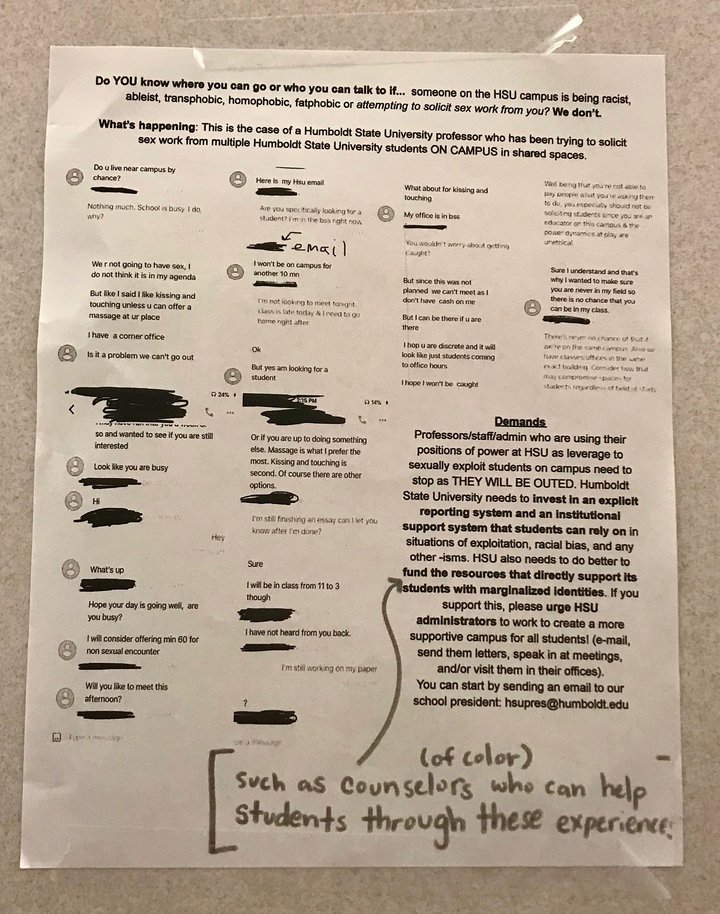
HSU | Photo courtesy of the CSU system
PREVIOUSLY:
###
Humboldt State began looking into allegations of faculty misconduct after what appears to be screenshots of messages between a student and a faculty member discussing an exchange of money for a number of activities were found on fliers on the HSU campus last Thursday.
A photo of the flier was provided to the Outpost and its authenticity was confirmed by HSU’s Title IX coordinator David Hickcox. (Title IX is a federal mandate passed in 1972 that outlaws discrimination based on gender and provides a reporting system for victims of sexual assault, violence and other forms of harassment.)
In the messages on the flier, the alleged faculty member says they have a corner office in “bss,” that they wish to have a student perform a number of activities on them and lists their HSU email address — however, this was redacted on the flier — among other desires.

A photo of the flier that was reportedly hanging in the Science A women’s bathroom. Click here for larger version.
“I will consider offering min 60 for non sexual (sic) encounter,” one of the messages reads. Although the alleged faculty member never explicitly states that they are seeking sex for money, another comment seems to push those boundaries.
“Massage is what I prefer the most. Kissing and touching is second,” a message reads. “Of course there are other options.”
Hickcox told the Outpost that the matter is under investigation because it may pose a threat to the campus, but without an official complaint filed from an alleged victim a formal Title IX investigation cannot be opened.
“We are not having a Title IX investigation right now, because for us to have a Title IX investigation we need someone to bring forward a complaint and we don’t have that,” Hickcox said. “We have evidence suggesting something has happened, but we don’t have someone coming forward and making a complaint.”
The university was made aware of the fliers on Thursday when it received two complaints (but not from any alleged victims). One of the complaints was sent to Hickcox and the other was made through an anonymous reporting system on the dean of student’s website. Hickcox said that senior administration members were made aware of the fliers on Thursday as well as a number of other administrators.
The number of students involved in the matter is unknown, and any reports of multiple students being involved are due to the wording on the flier. Hickcox said that any investigations into the matter are going to come with an expectation of privacy for those involved and if any consequences are issued they will be within the limits detailed in the collective bargaining agreements the university has with its employees.
“Hypothetically speaking, if there is evidence of misconduct from an employee, the way that is handled is going to be governed by whatever collective bargaining agreement that employee falls under,” Hickcox said. “We are not really comfortable with telling you what we have discovered in our investigation simply because it is a process.”
When asked where can students turn to if they are being solicited for sex, Hickcox pointed to the Sexual Assault Prevention Committee and the work they have been doing to bring a more consent-centered culture to the forefront of campus life. Kim Berry is one of the co-chairs of the committee, and said that students may report any concerns and incidents to the Title IX office as well as the Campus Advocate Team, where students can find a support group that can accompany them through the reporting process. Berry said that in order to stop acts of harm from occurring, society needs to go through a transformation.
“Ending sexual violence requires community and institutional transformation,” Berry said in an emailed statement. “Ultimately if we are to transform our communities and workplaces, including HSU, we need to change our culture. In short, we need to create accountable communities.”
Those accountable communities would encompass a knowledge of personal boundaries and consent as well as an understanding of power dynamics.
“Accountable communities require that we respect each other, reject the entitlement to take what we want regardless of how it affects others, and that we all work to dismantle hierarchies and challenge thinking that deems some people as worthy of care and respect and others as disposable, vulnerable to being exploited, manipulated, and abused,” Berry said. “In an accountable community we check in with ourselves to make sure we aren’t abusing our power, and we are willing to intervene when we see someone harming others.”
The Sexual Assault Prevention Committee also works with the student-run organization CHECK IT, which was started in February 2014. Mary Sue Savage is the program coordinator for CHECK IT and has been with the program since its inception six years ago. Savage said that power dynamics between students and faculty can be problematic.

Courtesy of HSU
“Unfortunately people use positions of power to exploit others especially when there are not equal relationships at play,” Savage said. “So with faculty and student relationships, that crosses so many boundaries and has an unequal balance and it heightens barriers when those dynamics are at play.”
Savage went on to say that while the campus community has been making progress in furthering a consent-centered culture, the community should continue to point victims at the center of the messaging and there is still a lot of work to do.
“We have to make clear to those who commit acts of harm, that it is not acceptable in our community,” Savage said.
###
Kim Berry and the Sexual Assault Prevention Committee’s full statement:
Sexual harassment and sexual misconduct occur in all workplaces in our society. These forms of harm continue in part due to a culture of denial and minimization that pervades most institutions, including many colleges and Universities. At HSU, the Sexual Assault Prevention Committee (SAPC) is working to challenge and change this culture. Members of the SAPC work to prevent harm in our community, and to increase HSU’s capacity to respond to harm when it happens. This includes providing survivors with options for support and accountability, and holding responsible the individuals who cause harm.
The SAPC works as a team, including members who focus on survivor support (Campus Advocate Team, staffed by North Coast Rape Crisis Team, Counseling and Psychological Services, and community partners such as Humboldt Domestic Violence Services), prevention (CHECK IT, our award-winning bystander intervention program, Peer Health, student clubs and organizations, including the Womxn’s Resource Center, and faculty teaching courses, such as Act to End Violence), and accountability (University Police Department, Title IX Office, Human Resources, and Academic Personnel Services). Ultimately we partner in each of these areas. For instance, our Campus Advocate Team (CAT) supports survivors whether they choose to report or not. CAT also helps survivors understand their options for reporting and is available to advocate for them throughout the process of seeking accountability through the Title IX Office or UPD. CHECK IT, Peer Health, Dean of Students Office, and other campus clubs and organizations help connect survivors with options for support and accountability.
However, in order to prevent acts of harm, we need to do much more than just hold responsible the individual people who harm others. Ending sexual violence requires community and institutional transformation. Ultimately if we are to transform our communities and workplaces, including HSU, we need to change our culture. In short, we need to create accountable communities. What would that look like? To start with it includes a shared understanding of boundaries, bodily autonomy, power dynamics, and consent. Accountable communities require that we respect each other, reject the entitlement to take what we want regardless of how it affects others, and that we all work to dismantle hierarchies and challenge thinking that deems some people as worthy of care and respect and others as disposable, vulnerable to being exploited, manipulated, and abused. In an accountable community we check in with ourselves to make sure we aren’t abusing our power, and we are willing to intervene when we see someone harming others.
Our collective focus so easily turns towards incidents in the news, such as this one. As someone who works to understand and prevent these forms of harm, I ask that you also turn the focus on yourself and your workplace to imagine how you can work to create an accountable community. Community accountability includes holding responsible the individuals who cause harm, but also demands much more than that. Preventing violence requires cultural transformation, and that’s work we all have to do.
***We understand that for some in our community this issue is very impactful. Community resources for survivor support are available:
North Coast Rape Crisis Team, 24-hour free & confidential support: (707) 445-2881; Humboldt Domestic Violence Services, 24-hour free & confidential support: (707) 443-6042.
CLICK TO MANAGE